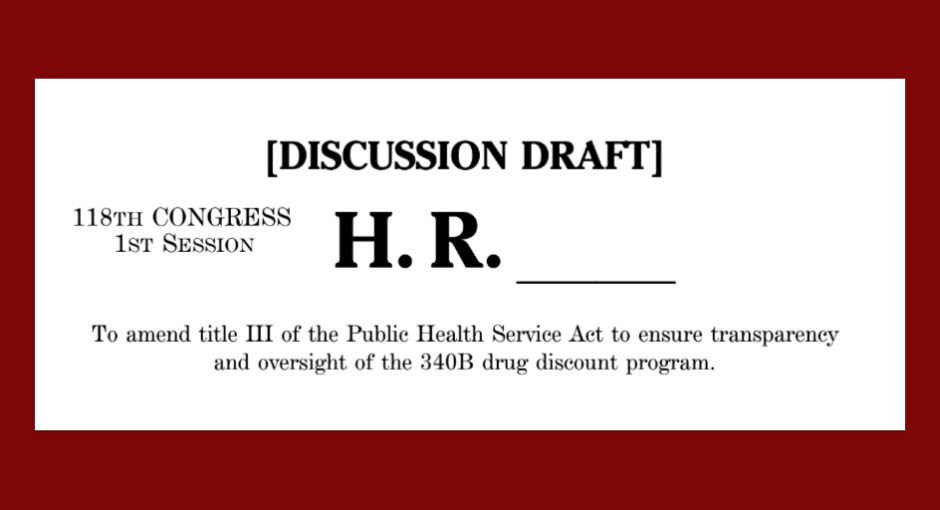U.S. Rep. Larry Bucshon (R-Ind.), vice chair of the House Energy & Commerce health subcommittee, has written a bill to impose significant 340B program reporting requirements on disproportionate share hospitals and potentially other covered entities. Meanwhile, two bills have been introduced by Republican U.S. senators, one of which would require 340B covered entities to pass all of their discounts to patients including those with insurance.
Bucshon’s bill is labeled a discussion draft and has not been formally introduced. The subcommittee is holding a hearing Wednesday, April 26, on how it and 16 other actual and proposed bills can increase transparency and competition in health care. The subcommittee held a hearing on transparency and competition March 28. During it, Bucshon said he hoped eventually to work on broad reforms to 340B. In the interim, he said, “can we not agree that entities benefiting from the discounts need to show the American people what they’re doing with the savings? For that matter, what the savings are?”
Bucshon’s draft bill, released by the subcommittee yesterday, is the only one of the 17 focused squarely on 340B. Others address pharmacy benefit manager accountability, site neutral payments, the effects of Medicare regulatory changes on provider and payer consolidation, and other matters, some of which touch on 340B. Bucshon’s draft is dated Jan. 31, 2023. This indicates it might have been circulating privately on Capitol Hill and presumably K Street for months.
The bill would require DSH hospitals “and any other covered entity” that the U.S. Secretary of Health and Human Services specifies to report annually for each parent and child site:
I.
- The total number of individuals who were dispensed or administered 340B drugs.
- The numbers of individuals who
- were entitled to Medicare Part A benefits or enrolled in Part B
- were enrolled in Medicaid
- were uninsured.
II.
- The percentage of individuals who were dispensed or administered 340B drugs.
- The percentages who
- were entitled to Medicare Part A benefits or enrolled in Part B
- were enrolled in Medicaid
- were uninsured.
III.
- Total annual costs incurred for each parent and child site.
- Total annual costs incurred at each parent and child site for charity care (line 23 of worksheet S–10 to the Medicare cost report).
IV.
- The costs at each child site of serving individuals who
- were entitled to Medicare Part A benefits or enrolled in Part B
- were enrolled in Medicaid
- were uninsured.
- The costs above, minus the sum of
- payments for services under Medicare
- payments for services under Medicaid
- payments by uninsured individuals.
V.
- For each parent and child site:
- net revenue from 340B drugs
- how such revenue was used.
“Individuals” above is defined as
- those covered under a group health plan or group of individual health insurance
- those covered under Medicare Part A or enrolled in Part B
- those enrolled in Medicaid
- those enrolled in a state CHIP plan
- anyone not described above “and not covered under any federal health care program” including insurance for federal government organizations and employees.
HHS would have to publish the data it collects in searchable form on 340B OPAIS, the 340B program database, “in a manner that shows each category of data reported in the aggregate and identified by the specific covered entity submitting such data.”
HHS would have 180 days after the enactment date to issue an interim final rule to carry out these new requirements.
Bucshon’s bill also would let HHS audit covered entity records to determine how entities use their net income from 340B drug purchases. Entities would have to keep and provide records as HHS deemed necessary.
This is almost the same as recommended legislative language in the Biden administration’s fiscal year 2022 budget proposal, with one omission: It would not authorize HHS to promulgate regulations to carry out the requirement. The administration asked for the auditing power in its fiscal 2023 and 2024 budgets.
Early this week, Congress.gov, the official website for U.S. federal legislative information, revealed that Sen. Mike Braun (R-Ind.) introduced a bill, S 1113, on March 30 with this same language. Braun, who is on the Senate Health, Education, Labor, and Pensions Committee with jurisdiction over the 340B program, sponsored an identical bill in the 117th Congress.
Kennedy Bill Aimed at All 340B Covered Entities
In another related development, Sen. John Kennedy (R-La.) this week introduced a bill, not yet numbered or posted on Congress.gov, that essentially would require all covered entities to pass the value of all their 340B program savings to patients who get 340B-acquired drugs—including the value of “any additional discounts or rebates” entities get on such drugs. That probably includes the value of sub-340B prices obtained from participating in the 340B prime vendor program, a 340B program veteran said.
Under the legislation, 340B providers would be required to bill all patients at acquisition cost including insured patients. The bill appears to be the first one introduced in decades that would prohibit 340B covered entities from retaining any savings from its 340B purchases, according to 340B Report Publisher and CEO Ted Slafsky.
The bill also would require entities to report annually to HHS:
- the total amount they paid for 340B covered outpatient drugs
- the total amount they received for such drugs
- “If a covered entity receives any revenue as a result of charging a price for a covered outpatient drug that exceeds the price at which the covered entity purchased the drug, how the covered entity spent such revenue.”
HHS would have to make the information collected publicly available.


